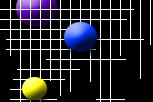All of the planets were named after Greek gods and goddesses. However, when the Romans defeated the Greeks they substituted their gods names. These are the ones we use today.
Meteors
Meteor showers occur pretty much on a schedule. A shower is named after the constellation its coming from. Meteor showers are the remains of old comets that have broken down into small pieces by the heat of the sun. There are ten major and four-teen minor meteor showers a year.
Asteroids
Asteroids are rocky and metallic objects that orbit the Sun, but are too small to be considered planets. They are known as minor planets. Asteroids range in size from Ceres, which has a diameter of about 1000 km, down to the size of pebbles. Sixteen asteroids have a diameter of 240 km or greater. They have been found inside Earth's orbit to beyond Saturn's orbit. Most, however, are contained within a main belt that exists between the orbits of Mars and Jupiter. Some have orbits that cross Earth's path and some have even hit the Earth in times past.
Constellations
Some constellations are Andromeda, Draco, and Hercules. Andromeda means the chained lady. The principal star of this constellation is Alpheratz. Draco means Dragon. The principal star of this constellation is Thuban. The meaning of Hercules is Hero. Its principal star is Ras Algethi.
Satellite Objects
There are 4.914 satellite objects orbiting around Earth. About 4/5 of those objects is space junk. Such as rocket bodies, nose cones, and spent fuel containers. The total number of satellite objects shot into space since the first one is 14,000. Since then 2/3 of them have fallen back to Earth.

